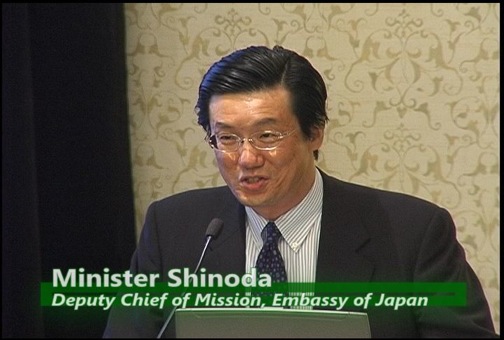Ambassador Shinoda US-Japan Disabilities Cooperation Speech
Deputy Chief of Mission Shinoda, Embassy of Japan
Speech on Cooperation and New Japan-US Healthcare Exchange (Video)
at the
First Annual US-Japan Goodwill Exchange "Meeting of the Minds"
Washington, DC, July 13, 2008
Speech on Cooperation and New Japan-US Healthcare Exchange (Video)
at the
First Annual US-Japan Goodwill Exchange "Meeting of the Minds"
Washington, DC, July 13, 2008
(Mayer Max) We have the honor to introduce and welcome Minister Shinoda, Minister Plenipotentiary, Deputy Chief of Mission, Embassy of Japan, who was kind enough to offer to address the Conference and Goodwill Exchange between the US and Japan.
(Minister Shinoda) Thank you for the very kind introduction, Mr. Max, who is a Judo practitioner in Washington.
Good morning, it is my great honor and pleasure to be invited here and to welcome you to this FIrst Annual US-Japan Goodwill Exchange and International Symposium.
As you may know, last week Japan had the privilege of hosting the leaders of the G8 industrialized nations in Hokkaido, Japan. The Prime Minister of Japan joined with the President of the United States and many other world leaders in discussing the world economy, environmental concerns and other pressing issues facing the International Community.
I am grateful for my opportunity today to join with you and to accept your hospitality and goodwill. You are undertaking important discussions on Traumatic Brain Injury, Autism, and Special needs or disabilities. Joint efforts between our nations, our medical leaders, and leading research institutions such as your National Institutes of Health, Veterans Health Administration, the Brain Injury Association of America and MindKnit Research Center will help better the lives of vulnerable citizens, their communities and workplaces and help families around the world.
We are honored to accept a leadership role in this initiative particularly through the tireless efforts of Dr. Fukatsu whom we have here in this room, Director of the Japan National Rehabilitation Center for Disabilities. I believe that Dr. Fukatsu will illustrate shortly the specific measures to support those with disabilities to lead as normal daily lives as those without disabilities.
Let me briefly outline the governmental measures to tackle this issue.
The government of Japan is aiming to construct communities in which people can enjoy independence and coexistence. In such communities people would be expected to support each other regardless of whether they have handicaps or not, so that those with disabilities can live comfortably.
In order to realize such communities the government provides a variety of support systems through legislation. For example, regarding Higher Brain Dysfunction, the government conducted nationwide research to recognize real needs for those with Higher Brain Dysfunction in 2001. As a result, nowadays each local government is providing basic support to those with Higher Brain Dysfunction under the Services and Support for Persons with Disabilities Act which went into effect in 2006.
With regard to the support for those with Developmental Disorders, the government provides specific support through the law supporting those with Developmental Disabilities which took effect in 2005.
Today's exchanges, i believe are an important part of our two nations' across the board cooperation in the areas of healthcare and improving the lives of Individuals with Disabilities such Veterans with Traumatic Brain Injury as well as all individuals with Autism and Special Needs.
Our discussions here address disabilities that present significant challenges in social transition and the inclusion of individuals with disabilities into complex societies which is made even more complicated by the impact of rapidly evolving technologies.
Such initiative, I believe, will help build a better world by ensuring that individuals with disabilities lead full, healthy, and productive lives though effective integration into civil society.
In closing, I wish you the greatest success at this Goodwill Exchange, and we look forward to future conferences ...in Japan..and the United States to build stronger relationships and worldwide communities for years to come.
Thank you very much.
( Applause from the Symposium).
Previous page: National Study- Vets with TBI Reintegration to University
Next page: Japan Tsunami Shelter, Medical, Radiation Recovery Info

Ippakutei - US-J Goodwill Exchange.jpg)
